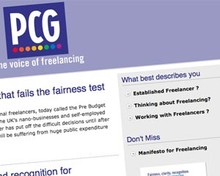
The growth of freelancing
Today there are 1.4 million freelancers in the UK, signifying a 14 per cent growth over the last decade. Some of them have chosen to go freelance, others have had freelancing thrust upon them in the face of redundancy and are opting to take that route to plug the gap. Whichever way you look at it, freelancers are considered to be the lifeblood of the economy and in 2008 their contribution to the UK GDP was estimated to stand at £82 billion.
If you are thinking of joining the freelance community in the UK it is not an easy option, but it can lead to a fulfilling and exciting career. A recent survey commissioned by PCG and conducted by ComRes found that 87 per cent of those already freelancing wouldn’t advise people to go freelance before they have gained sound professional expertise in their field.
Is freelancing for you?
The common reasons cited for going freelance include: Being your own boss; having freedom and striking the work/life balance; and potentially avoiding having all your eggs in one employment basket by working on a range of projects with a number of clients. The pitfalls include: Less security; uncertainty; hassle in running your own business with forms and legislation; and working on your own and being 100 per cent accountable.
Know your marketplace
Before you take the leap it is important to research your market and understand where you could fit in, how many freelance journalists already work in your area, who is the competition, and how much do they charge? You can then position yourself accordingly.
It is possible to research your earning potential as a freelancer – a range of online calculators exist that can help you work out likely return based on a reasonable assumption of the amount of work you could secure – but don’t forget to factor in the costs associated with being in business and any pension or insurance options that you may now need to consider. We would suggest that you take a pessimistic outlook and ensure that you can ‘make ends meet’ whilst waiting for that ‘first gig’.
It is also a good idea to consider the impact of going freelance on any potential changes in your situation, such as the need to get a mortgage in the near future. If a change is on the cards then do seek expert guidance, it may not be a problem, but check!
The practicalities need careful consideration. Seek out good professional advice from experts – accountants, personal finance advisors and insurance brokers – those who understand the contracting and freelance marketplace and model and can help you establish and manage the business model that best suits you (e.g. sole trader, limited company, umbrella etc.). PCG publishes a guide to freelancing – free to download at www.pcg.org.uk/guidetofreelancing – and provides a useful source of information for new and established freelancers about running and nurturing a successful business.
Networking can also be instrumental in helping you make your decision; talking to people that you know and seeking out local networking groups can be very useful. Sites such as Twitter can also give you some fascinating insight into the daily worries, problems and experiences of people currently at the coal face (they should also give you a clue about how easy work is to come by and the competitive environment that you will be entering).
Ready to make the leap
With your business set up properly, you can focus on your core function of being a journalist, securing work, and handling clients. Marketing yourself is important, and as you move from role to role your portfolio will become your strongest selling tool. It can demonstrate your successes and highlight your experience and expertise. Examples of your work can be shown digitally or as a traditional portfolio. Include examples of your writing, the range of topics you can write about and the types of publications you have written for, and always keep your portfolio up-to-date.
You will need to brush up on your sales skills and consider how best to promote your business. Actively network with your old contacts, it is time to get that address book out and start looking on Linkedin and Facebook for old colleagues. You may also want to invest in a website so clients can see your credentials at a glance.
Remember that you are now in business and that your business is your skill and time. Don’t sell yourself short or let people take advantage of you.
Tomorrow part two will cover some of the practical elements of freelance journalism including contracts and copyright.
John Brazier is managing director of PCG, an independent organisation that represents the UK's freelance community.
Free daily newsletter
If you like our news and feature articles, you can sign up to receive our free daily (Mon-Fri) email newsletter (mobile friendly).
Related articles
- Three free AI-powered transcription tools for journalists
- OMG is it that time again? The tax troubles of a freelancer
- How to build a successful working relationship with editors
- Buzzfeed, Gal-dem, VICE…: What the closure of big digital media brands means for freelancers
- How The Bristol Cable is diversifying its freelancing opportunities









